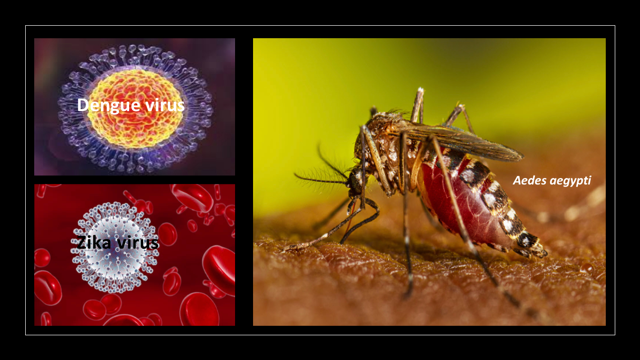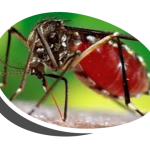Have you ever wondered why after a night’s sleep, you discovered that you had been bitten black and blue by mosquitoes while other people in the house were relatively unscathed? The answer is that you are too tasty for mosquitoes! It is likely that you are harbouring malaria parasites, Zika or dengue viruses which have altered your body odour so that you smell more attractive to mosquitoes.
Zika is a mosquito-borne viral infection, which causes microcephaly and other neurological problems in the newborn, if the mother is infected during the course of the pregnancy. Microcephaly is a condition whereby a baby’s head is smaller than normal meaning that the brain is also smaller and may not develop properly. Dengue is also a viral infection spread by mosquitoes. Severe dengue fever causes haemorrhage or internal bleeding, which may lead to organ failure and death.
Join our WhatsApp ChannelZika and dengue viruses literally hitch a ride inside mosquitoes to jump into their next victims. If you were a mosquito, and a good capitalist as well, the most likely question you would ask is, “If I gave you a ride, what would be in it for me?” The answer, discovered recently, is that Zika and dengue viruses spice up the appetite by making the food (i.e. hosts) smell more attractive to mosquitoes. You know, mosquitoes are rather epicurean these days, and just don’t eat (or rather suck) any old junk, what with an array of meals (humans) to choose from.
The Zika and dengue viruses are not doing anything new that had not been done before by other viruses. The basic means of dissemination by viruses or protozoans unable to go through the normal route of spreading by airborne or air droplets or person-to-person contact, is by hitching a ride inside a third party. We shall illustrate this process with a mosquito: when a mosquito feeds on a host (i.e. a person) having viral particles or plasmodium parasites circulating in the host blood, the viruses or the plasmodium parasites are established in the vector (i.e. the mosquito) and are subsequently transmitted to new hosts when the mosquito feeds. This is how malaria parasites are transmitted. But to induce a more efficient transmission to naive hosts (i.e. those not previously exposed to the viruses or parasites), the pathogens have evolved to alter the body odour of the infected hosts to make them more attractive to vectors.
It is generally known that when a person is sick, the body odour changes due to the expression of certain molecules. Many factors including heat, carbon dioxide, and body odours, have been known to influence the feeding pattern of mosquitoes. For example, malaria parasites alter the odour of their human host to make the person smell nicer to mosquitoes. Similarly, COVID-19 patients gave off odours strong enough for dogs to detect.
The emission of signature odours is not only limited to the aforementioned, but is seen in many diseases: Tuberculosis (TB) patients smell like stale beer, people with typhoid fever have the odour of baked bread, and those suffering from yellow fever often emit the odour of meat like a butcher’s shop. The occurrence is even seen in plants. Plants infected with cucumber mosaic virus (CMV), a condition, which results in stunted growth and causes cucumbers to have a pale appearance, releases a blend of volatile organic compounds to attract aphids. The virus then uses the aphids as vectors to infect new plants.
Traditionally, Zika, dengue, yellow fever and chikungunya viruses are transmitted from person-to-person by the mosquito, Aedes aegypti. Zika and dengue viruses account for about 400 million infections annually. It is not known if the two viruses employ alteration of host’s body odour for enhanced transmission. To test this hypothesis therefore, Gong Cheng and coworkers writing in the July 2022 issue of the journal, Cell, conducted an olfactometer assay.
In the assay, they constructed an interconnected three-cage mice experiment. In one cage, they had Zika virus-infected mice, and in the opposite cage were placed healthy mice. The cage in the middle contained 60 female mosquitoes of Aedes aegypti (remember that male mosquitoes are harmless guys and prefer plant juice to blood, they are vegans. But the females are another kettle of fish, they are the ones to be feared because, they love blood meals). The researchers piped in air into both cages, which blew across to the mosquitoes in the centre cage.
The result was that up to 2 days after infecting the mice with the Zika virus, the number of mosquitoes attacking both the infected mice and the uninfected mice was 50%:50% but between 4 and 6 days after infection, the ratio dramatically changed to 70%:30% in favour of the Zika-infected mice. The same pattern was observed when mice infected with dengue virus were introduced. But when the air coming from the infected mice were purified by passing it through a filtration unit to trap the odour, the mosquitoes showed no feeding preference to either of the mice subjects, thus, suggesting that the odour from the infected mice was influencing the feeding pattern of the mosquitoes.
When compounds isolated from the armpits of dengue patients were applied to human hands, it influenced mosquito feeding habits by attracting mosquitoes only to those hands smeared with the compound. The researchers were able to narrow down the source of the mosquito-loving odour to a volatile compound called acetophenone, from a possible total of 420 other compounds. Acetophenone is an organic compound, which has many uses in pharmaceuticals, perfumes, is used as flavouring agents in food industries, etc. Further analyses did show that mice infected with dengue viruses emitted almost 10 times more acetophenone than uninfected mice, ditto with dengue-infected patients.
The researchers were able to ascertain that certain skin-living microorganisms rather than gut microbiota (ie microorganisms living in the intestine), especially bacteria from the genus, Bacillus, were responsible for the production of the mosquito attractant compound, acetophenone. Normal skin cells contain a protein called resistin-like molecule alpha (RELMα), which acts as an antimicrobial protein. It is required especially for vitamin-A-dependent resistance to skin infection and acts by suppressing the skin microbiota. Mice infected with Zika or dengue viruses produce less of the RELMα protein leading to a proliferation of skin bacteria that produce the mosquito-attractant acetophenone! Indeed when a derivative of vitamin A, called isotretinoin, which is used to treat acne and certain skin cancers, was fed to mice, the mosquitoes found the isotretinoin-fed mice less tasty.
The current clinical method used to identify patients with Zika and dengue fevers, is by blood test, but the result is not immediately available. Therefore, developing an “electronic nose” to detect acetophenone emitted by a person could be a quicker means of diagnosis for Zika or dengue fevers.
Also taking steps to reduce the mosquito-attractiveness of patients with Zika or dengue fevers might check the transmission of the viruses. In this regard, it would be tempting to recommend putting Zika or dengue patients on a course of vitamin A, but such a measure risks side effects like diarrhoea, irritability, drowsiness, sensitivity to sunlight, hair loss, etc.
One of the limitations of the experiment is that the mice used in the experiments were lab mice, therefore, the skin microbiota and load (ie the variety of microorganisms living in the skin and their populations) were quite different from mice living in the wild. Additionally, that isotretinoin, a synthetic vitamin A analogue, was found to be effective in reducing mosquito-attractiveness in mice does not mean that it would equally be effective in humans. This is because the skin composition and microbiota of mice and humans are not the same. Therefore, experiment conducted with human subjects is necessary to validate the role of vitamin A in reducing the attractiveness of patients with Zika or dengue fevers to mosquitoes.
But in the meanwhile, this is certainly a case where making yourself attractive does not pay any dividend!


















Follow Us